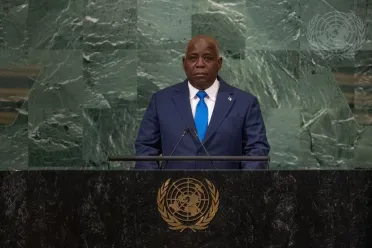Statement
Statement summary
PHILIP EDWARD DAVIS, Prime Minister and Minister for Finance of the Bahamas, said the people of his country are justifiably proud of what they have accomplished in the country’s 50 years of independence. However, Hurricane Dorian in 2019, followed by the COVID-19 pandemic in 2020 impacted his country. Prior to that, the Bahamas welcomed millions of visitors every year. With no visitors coming to visit, due to the pandemic, the health crisis quickly became an economic and education crisis. Now, a global inflation crisis is making the basics of life unaffordable for too many, creating more hardships for people in his country and around the world. In addition, everyday his country must also defend its ocean borders from trafficking in people, drugs and guns. Further, among all challenges faced by the international community, none requires more urgent action than the climate crisis. Yet, despite decades of conferences and meetings featuring warnings from scientists and experts, one sixth of all carbon emissions ever — some 407 billion tons — occurred between 2010 and 2020.
Calling for climate justice and fairness, he asked why small island developing States who have contributed so little to the problem experience the biggest burdens. The transition to clean energy will create jobs, increase efficiencies and improve living standards. However, countries like his own, trapped by billions in climate debt, need funding to transition to renewable energy infrastructures. In February and July, his country hosted the One Young World regional and annual conferences for young people regarding climate-related issues. In addition, in August, the Bahamas brought together the Caribbean countries to agree on consensus positions for negotiations at the twenty-seventh Conference of Parties to the United Nations Framework Convention on Climate Change (COP27). It is also actively defining ways to safeguard its shallow seas, mangroves and seagrasses — all of which act as a major carbon sink for the world, he said, inviting those with technological solutions to bring their innovations to his country.
Recalling that, last year, he informed the General Assembly of the threat to the financial services industry in his country and the region, he noted that “sadly, little to nothing has changed”. “Now, we are yet again the victims of inequitable and unjust measures on the part of major economic actors,” he said, recounting that just yesterday the Organization for Economic Co-operation and Development (OECD) issued a statement placing his country on its blacklist. Calling that action profoundly unfair, he asked why European States that operate frameworks akin to that of blacklisted countries are not eligible for inclusion in that list. He further asked why all the countries targeted are small, vulnerable and former colonies of European States. The $2 trillion to $3 trillion estimated to be laundered each year through the developed countries are never flagged as causes for concern. Yet, the Bahamas, which is widely recognized as one of the best regulated in the world, is singled out for such reputational attacks. He pointed to the “darker issues of prejudged discriminatory perceptions”, stressing that: “Black-governed countries also matter.” He voiced support for reforms in the global financial system, adding that international financial institutions can and should forgive the debt incurred due to the economic shutdown of COVID-19.
Noting that crises in neighbouring countries impacts his own, he reiterated his country’s opposition to the decades-long embargo and sanctions on Cuba, stressing that COVID-19 has made the existing hardships of its people much worse. As well, the people of Haiti continue to suffer, with instability in the country fuelling more tragedy and threatening the entire region. In addition to migration, his country is also struggling with the proliferation of guns. While they are not manufactured in the Bahamas, they illegally find their way into the country and within days can be connected to some criminal activity. Defending its borders is an expensive challenge. Efforts can be made at the source to ensure that a right to bear arms does not quickly and easily translate into a right to traffic arms. He also recalled the Alliance of Small Island States’ work in 2020 on the Multidimensional Vulnerability Index — a critical step forward in ensuring greater equity for countries such as his own. Noting the need for a more robust and better change-making architecture across the United Nations, he voiced hope that Member States will support the candidature of Stephen Bereaux for the seat of director of the Telecommunication Development Bureau of the International Telecommunication Union(ITU) for the 2023-2026 term.
Full statement
Read the full statement, in PDF format.
Photo

Previous sessions
Access the statements from previous sessions.
